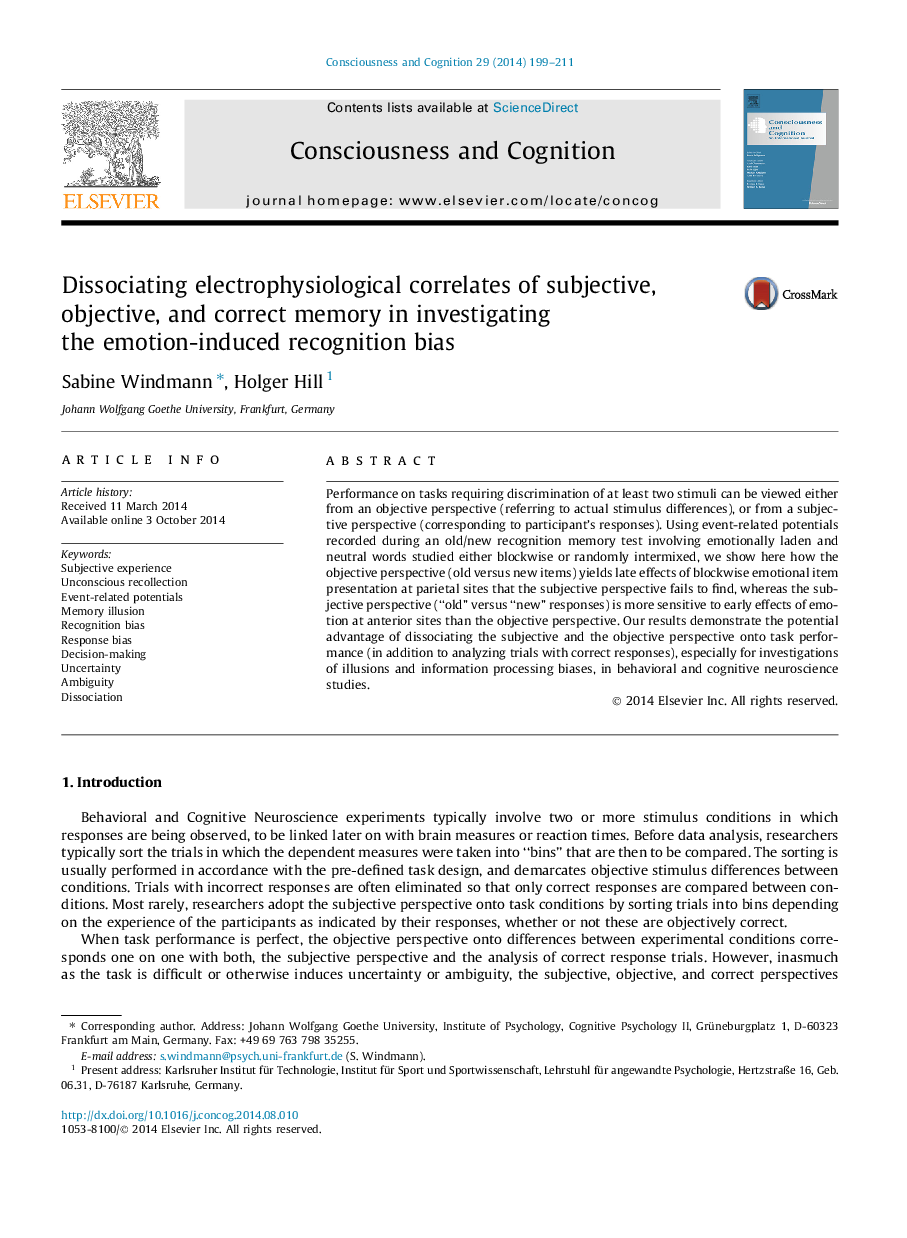| کد مقاله | کد نشریه | سال انتشار | مقاله انگلیسی | نسخه تمام متن |
|---|---|---|---|---|
| 7289868 | 1474182 | 2014 | 13 صفحه PDF | دانلود رایگان |
عنوان انگلیسی مقاله ISI
Dissociating electrophysiological correlates of subjective, objective, and correct memory in investigating the emotion-induced recognition bias
ترجمه فارسی عنوان
جداسازی ارتباطات الکتروفیزیولوژیکی حافظه ذهنی، عینی و صحیح در بررسی تعصب شناختی ناشی از احساسات
دانلود مقاله + سفارش ترجمه
دانلود مقاله ISI انگلیسی
رایگان برای ایرانیان
کلمات کلیدی
تجربه ذهنی، خاطره ناخودآگاه، پتانسیل مربوط به رویداد، توهم حافظه، تعصب شناسی، تعصب پاسخ، تصمیم سازی، عدم قطعیت، بی نظمی، انحلال،
ترجمه چکیده
عملکرد وظایفی که نیاز به تبعیض حداقل دو انگیزه را می توان از دیدگاه عینی (با توجه به تفاوت های محرک واقعی) یا یک دیدگاه ذهنی (مطابق پاسخ های شرکت کننده) مشاهده کرد. با استفاده از پتانسیل مربوط به رویداد ثبت شده در آزمون حافظه شناختی قدیمی / جدید که شامل کلمات احساسی و نامطلوب مورد مطالعه قرار گرفته است، به صورت بلوک یا به طور تصادفی در هم آمیخته شده است، ما در اینجا نشان می دهیم که چگونه دیدگاه عینی (قدیمی در مقایسه با موارد جدید) سایت هایی که دیدگاه ذهنی پیدا نمی کند، در حالی که دیدگاه ذهنی (پاسخ به پاسخ جدید) نسبت به اثرات اولیه عاطفه در سایت های قدامی نسبت به دیدگاه عینی بیشتر حساس است. نتایج ما نشان دهنده مزیت بالقوه تفکیک کردن دیدگاه ذهنی و عینی بر عملکرد وظیفه (علاوه بر تجزیه و تحلیل مطالعات با پاسخ صحیح)، به ویژه برای تحقیق توهم و تعصب پردازش اطلاعات در مطالعات عاطفی و شناختی علوم اعصاب است.
موضوعات مرتبط
علوم زیستی و بیوفناوری
علم عصب شناسی
علوم اعصاب شناختی
چکیده انگلیسی
Performance on tasks requiring discrimination of at least two stimuli can be viewed either from an objective perspective (referring to actual stimulus differences), or from a subjective perspective (corresponding to participant's responses). Using event-related potentials recorded during an old/new recognition memory test involving emotionally laden and neutral words studied either blockwise or randomly intermixed, we show here how the objective perspective (old versus new items) yields late effects of blockwise emotional item presentation at parietal sites that the subjective perspective fails to find, whereas the subjective perspective (“old” versus “new” responses) is more sensitive to early effects of emotion at anterior sites than the objective perspective. Our results demonstrate the potential advantage of dissociating the subjective and the objective perspective onto task performance (in addition to analyzing trials with correct responses), especially for investigations of illusions and information processing biases, in behavioral and cognitive neuroscience studies.
ناشر
Database: Elsevier - ScienceDirect (ساینس دایرکت)
Journal: Consciousness and Cognition - Volume 29, October 2014, Pages 199-211
Journal: Consciousness and Cognition - Volume 29, October 2014, Pages 199-211
نویسندگان
Sabine Windmann, Holger Hill,
